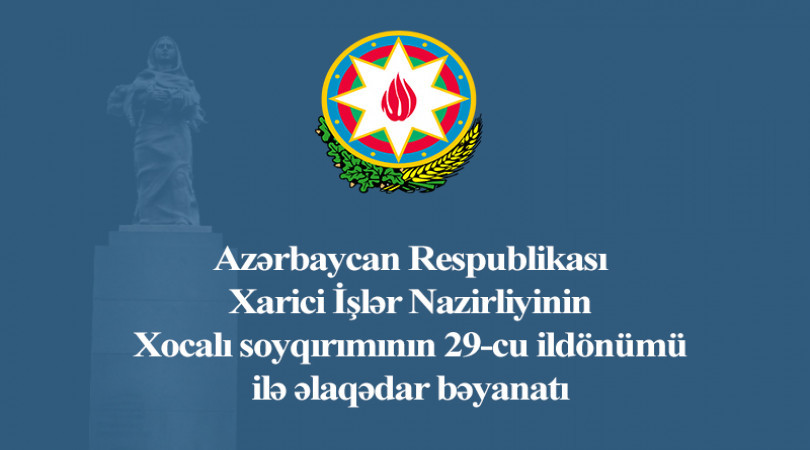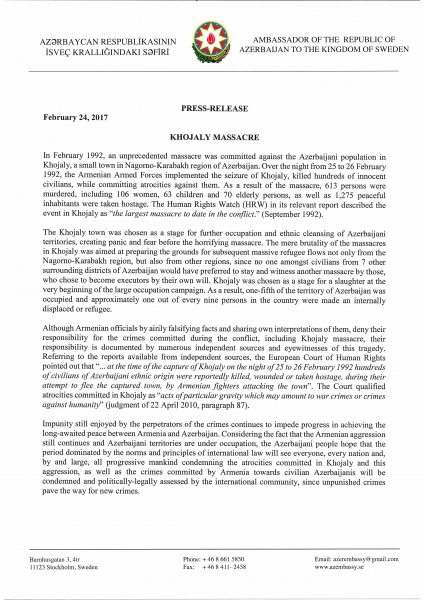25th anniversary of Khojaly genocide
In February 1992, an unprecedented massacre was committed against the Azerbaijani population in Khojaly, a small town in Nagorno-Karabakh region of Azerbaijan. Over the night from 25 to 26 February 1992, the Armenian Armed Forces implemented the seizure of Khojaly, killed hundreds of innocent civilians, while committing atrocities against them. As a result of the massacre, 613 persons were murdered, including 106 women, 63 children and 70 elderly persons, as well as 1,275 peaceful inhabitants were taken hostage. The Human Rights Watch (HRW) in its relevant report described the event in Khojaly as “the largest massacre to date in the conflict.” (September 1992).
The Khojaly town was chosen as a stage for further occupation and ethnic cleansing of Azerbaijani territories, creating panic and fear before the horrifying massacre. The mere brutality of the massacres in Khojaly was aimed at preparing the grounds for subsequent massive refugee flows not only from the Nagorno-Karabakh region, but also from other regions, since no one amongst civilians from 7 other surrounding districts of Azerbaijan would have preferred to stay and witness another massacre by those, who chose to become executors by their own will. Khojaly was chosen as a stage for a slaughter at the very beginning of the large occupation campaign. As a result, one-fifth of the territory of Azerbaijan was occupied and approximately one out of every nine persons in the country were made an internally displaced or refugee.
Although Armenian officials by airily falsifying facts and sharing own interpretations of them, deny their responsibility for the crimes committed during the conflict, including Khojaly massacre, their responsibility is documented by numerous independent sources and eyewitnesses of this tragedy. Referring to the reports available from independent sources, the European Court of Human Rights pointed out that “... at the time of the capture of Khojaly on the night of 25 to 26 February 1992 hundreds of civilians of Azerbaijani ethnic origin were reportedly killed, wounded or taken hostage, during their attempt to flee the captured town, by Armenian fighters attacking the town”. The Court qualified atrocities committed in Khojaly as “acts of particular gravity which may amount to war crimes or crimes against humanity” (judgment of 22 April 2010, paragraph 87).
Impunity still enjoyed by the perpetrators of the crimes continues to impede progress in achieving the long-awaited peace between Armenia and Azerbaijan. Considering the fact that the Armenian aggression still continues and Azerbaijani territories are under occupation, the Azerbaijani people hope that the period dominated by the norms and principles of international law will see everyone, every nation and, by and large, all progressive mankind condemning the atrocities committed in Khojaly and this aggression, as well as the crimes committed by Armenia towards civilian Azerbaijanis will be condemned and politically-legally assessed by the international community, since unpunished crimes pave the way for new crimes.


















